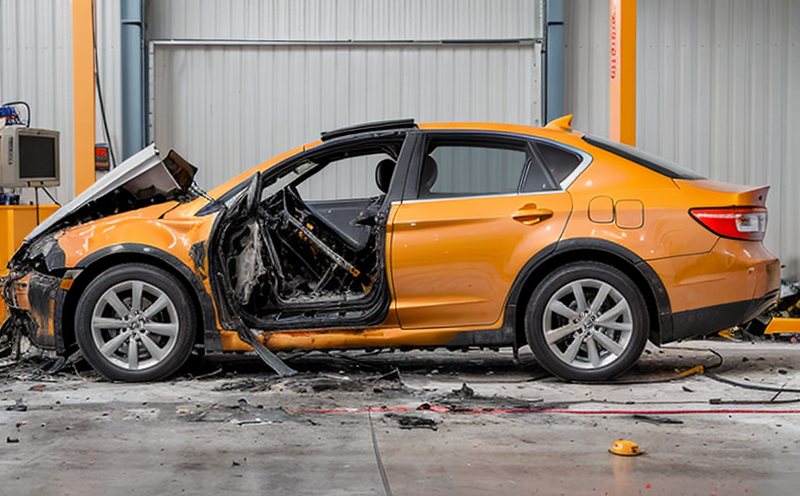UL 2054 Mechanical Shock and Crash Testing of Household and Commercial Batteries
The UL 2054 standard is a critical benchmark in the battery industry, ensuring that household and commercial batteries can withstand mechanical shocks and crash conditions without failing. This test evaluates the safety and durability of batteries under simulated real-world scenarios that could occur during transportation, storage, or use.
Manufacturers and suppliers must comply with UL 2054 to ensure their products meet stringent safety requirements, which enhances consumer confidence and regulatory compliance. The testing process involves subjecting battery units to various mechanical shocks, drops, and impacts to assess potential failure modes that could lead to fire hazards or other dangerous situations.
The UL 2054 test protocol is designed to mimic the stresses batteries might experience in transit, storage, or even during accidental collisions. These tests are essential for ensuring the reliability and safety of lithium-ion (Li-ion), nickel-metal hydride (NiMH), lead-acid, and other types of rechargeable and non-rechargeable batteries used in everyday applications.
The test setup typically includes a specialized mechanical shock tester capable of delivering precise levels of impact force. The battery units are secured in place within the test fixture to ensure they remain stationary during the impact. Various drop heights, angles, and directions are tested to replicate potential real-world conditions.
For household batteries, the focus is on ensuring they can withstand minor impacts that might occur during home use or storage. For commercial batteries used in electric vehicles (EVs) or large-scale power storage systems, the tests simulate more severe crash scenarios to ensure robust performance under extreme conditions.
The testing process involves multiple stages, including initial configuration of the battery unit within the test fixture, calibration of the shock tester, and execution of the impact sequence. Each impact is carefully monitored for any signs of structural damage or functional failure. After each test cycle, the battery is inspected to check for cracks, bulges, or other visible defects that could indicate a potential safety hazard.
The UL 2054 standard also specifies acceptance criteria that must be met for a battery unit to pass the mechanical shock and crash tests. These criteria include structural integrity, electrical functionality, and the absence of any signs of thermal runaway or fire risk. Failure to meet these standards can result in product recalls and potential legal consequences.
In addition to ensuring safety, UL 2054 compliance also enhances brand reputation and marketability. Consumers increasingly demand products that are not only functional but also safe and reliable. By demonstrating adherence to this stringent standard, manufacturers can differentiate their products in a competitive market.
The testing process is highly technical and requires precise instrumentation and experienced personnel to ensure accurate results. Our laboratory utilizes state-of-the-art equipment and follows strict protocols to provide reliable and repeatable test results. This ensures that our clients receive the highest quality assurance for their battery products.
Applied Standards
| Standard | Description |
|---|---|
| UL 2054 | Specifically designed for testing household and commercial batteries to ensure they can withstand mechanical shocks and crash conditions. |
| IEC 62133 | International standard that provides guidelines for the safety of rechargeable portable sealed secondary cells and batteries used in consumer products. |
| EN 50609 | A European standard covering the mechanical strength requirements of lead-acid batteries, particularly focusing on impact resistance. |
| ASTM G178 | An American standard for determining the susceptibility of metallic materials to stress corrosion cracking by means of static tensile testing in aqueous chloride solutions. |
Benefits
The benefits of UL 2054 mechanical shock and crash testing extend beyond ensuring product safety. By undergoing this rigorous testing, manufacturers can:
- Elevate brand reputation through adherence to stringent safety standards.
- Enhance consumer confidence in the reliability and safety of their products.
- Avoid costly recalls and potential legal issues by identifying and addressing potential hazards early in the development process.
- Demonstrate compliance with international regulations, opening up new markets for export.
- Ensure that battery units meet or exceed industry expectations for performance and durability.
Our testing services are designed to help manufacturers achieve these benefits by providing accurate, reliable, and repeatable test results. By partnering with our laboratory, clients can rest assured that their products have been thoroughly evaluated against the most stringent standards in the industry.
International Acceptance and Recognition
The UL 2054 standard is widely recognized and accepted across various industries, particularly in North America but also internationally. Many countries accept or reference this standard as part of their own regulatory frameworks for battery safety.
Battery manufacturers and suppliers from around the world rely on UL 2054 testing to ensure compliance with local regulations and to gain competitive advantage in global markets. The standard's reputation ensures that products meet rigorous safety requirements, which is crucial for maintaining trust among consumers and stakeholders.
Our laboratory plays a key role in facilitating international acceptance of battery products by providing comprehensive test services that adhere strictly to UL 2054 guidelines. This helps manufacturers navigate the complexities of global regulatory environments and opens doors to new opportunities in international markets.





